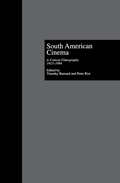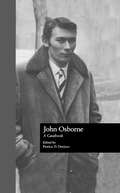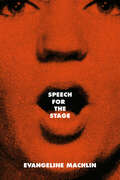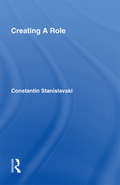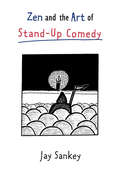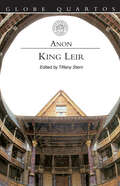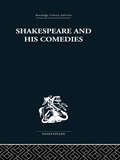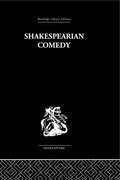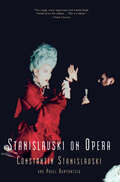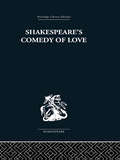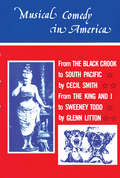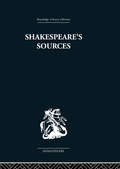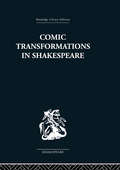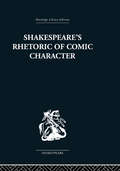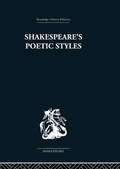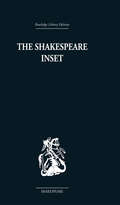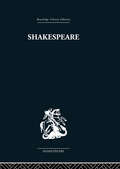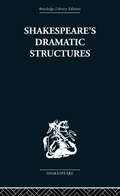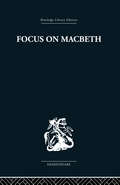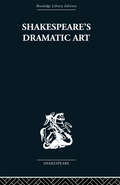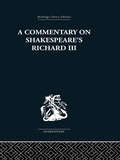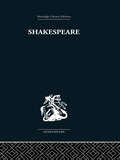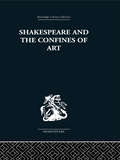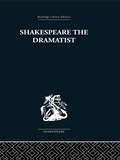- Table View
- List View
South American Cinema: A Critical Filmography, l915-l994 (Historical Dictionaries Of Literature And The Arts Ser.)
by Timothy Barnard Peter RistFirst Published in 1996. This text looks at the cinema from the countries of Argentina, Brazil, Canada, Chile, Colombia, Cuba, United States, Uruguay and Venezuela. Presented by country and date order it includes the silent black and white Gaucho films of 1915 to the colour films coming out of Venezuela in 1991. Each entry provides a summary of the film content, its context, production and significance in the genre. It includes an index and glossary of Brazilian (Portuguese or African) Terms and film terms.
John Osborne: A Casebook (Casebooks on Modern Dramatists #16)
by Patricia D. DenisonFor British playwright, John Osborne, there are no brave causes; only people who muddle through life, who hurt, and are often hurt in return. This study deals with Osborne's complete oeuvre and critically examines its form and technique; the function of the gaze; its construction of gender; and the relationship between Osborne's life and work. Gilleman has also traced the evolution of Osborne's reception by turning to critical reviews at the beginning of each chapter.
Speech for the Stage
by Evangeline MachlinFrom its original publication, thousands of actors have used this classic text to develop and refine their voice and speech. Evangeline Machlin includes warm-up routines for the voice but initially focuses on the importance of listening. She also discusses such important elements as relaxation, phonetics, articulation, resonance, pitch, rate of speech and stress. In addition, there are chapters on dialects, on reading aloud, sight reading, auditioning and performance.
Creating A Role (Bloomsbury Revelations Ser.)
by Constantin StanislavskiCreating a Roleis the culmination of Stanislavski's masterful trilogy on the art of acting. An Actor Prepares focused on the inner training of an actor's imagination. Building a Characterdetailed how the actor's body and voice could be tuned for the great roles he might fill. This third volume examines the development of a character from the viewpoint of three widely contrasting plays: Griboyedov's Woe from Wit, Shakespeare's Othello, and Gogol's The Inspector General. Building on the first two books, Stanislavski demonstrates how a fully realized character is born in three stages: "studying it; establishing the life of the role; putting it into physical form."Tracing the actor's process from the first reading to production, he explores how to approach roles from inside and outside simultaneously. He shows how to recount the story in actor's terms, how to create an inner life that will give substance to the author's words, and how to search into one's own experiences to connect with the character's situation. Finally, he speaks of the physical expression of the character in gestures, sounds, intonation, and speech. Throughout, a picture of a real artist at work emerges, sometimes failing, but always seeking truthful answers.
Creating A Role
by Constantin StanislavskiCreating a Roleis the culmination of Stanislavski's masterful trilogy on the art of acting. An Actor Preparesfocused on the inner training of an actor's imagination. Building a Characterdetailed how the actor's body and voice could be tuned for the great roles he might fill. This third volume examines the development of a character from the viewpoint of three widely contrasting plays: Griboyedov's Woe from Wit, Shakespeare's Othello, and Gogol's The Inspector General. Building on the first two books, Stanislavski demonstrates how a fully realized character is born in three stages: "studying it; establishing the life of the role; putting it into physical form."Tracing the actor's process from the first reading to production, he explores how to approach roles from inside and outside simultaneously. He shows how to recount the story in actor's terms, how to create an inner life that will give substance to the author's words, and how to search into one's own experiences to connect with the character's situation. Finally, he speaks of the physical expression of the character in gestures, sounds, intonation, and speech. Throughout, a picture of a real artist at work emerges, sometimes failing, but always seeking truthful answers.
Zen and the Art of Stand-Up Comedy (Theatre Arts Ser.)
by Jay SankeyIn this engaging and disarmingly frank book, comic Jay Sankey spills the beans, explaining not only how to write and perform stand-up comedy, but how to improve and perfect your work. Much more than a how-to manual Zen and the Art of Stand-Up Comedy is the most detailed and comprehensive book on the subject to date.
King Leir (Globe Quartos)
by AnonymousPerformed at the Globe Theater in 1605, King Leir is presumed to be a prime source for Shakespeare. Although the story is the same, in this anonymous version the ending is happy. This is the first time this fascinating work is published in a single-play edition
Shakespeare and his Comedies
by John Russell BrownFirst published in 1957. This edition reprints the second edition of 1962.The originality, vitality and variety of Shakespeare's comedies do not suggest a writer at ease with a formula which works to his own satisfaction and the pleasure of his audience; against first impressions they suggest an artist seeking to express an idea which is always eluding a completely developed presentation. The second edition of this book contains an extensive new chapter on Pericles, Cymbeline, The Winter's Tale and The Tempest.
Shakespearian Comedy
by H. B. CharltonFirst published in 1938. This is a survey of Shakepeare's comedies which illustrates the playwright's increasing grasp on the art and idea of comedy. Themes, characters and plays covered include: Romanticism in Shakespearian comedy; Shakespeare's Jew, Falstaff, The Taming of the Shrew, A Midsummer Night's Dream, and The Dark Comedies.
Stanislavski On Opera
by Constantin Stanislavski Pavel RumyantsevBest known for his fundamental work on acting, Stanislavski was deeply drawn to the challenges of opera. His brilliant chapters here on Russian classics--Boris Gudonov and The Queen of Spades among them--as well as La Boheme will amaze and delight lovers of opera. Also includes 12 musical examples.
Shakespeare's Comedy of Love
by Alexander LeggattFirst published in 1987. This study removes some of the critical puzzles that Shakespeare's comedies of love have posed in the past. The author shows that what distinguishes the comedies is not their similarity but their variety - the way in which each play is a new combination of essentially similar ingredients, so that, for example, the boy/girl changes in The Merchant of Venice are seen to have a quite different significance from those in As You Like It.
Musical Comedy in America: From The Black Crook to South Pacific, From The King & I to Sweeney Todd
by Cecil A. Smith Glenn LittonFirst Published in 1987. Routledge is an imprint of Taylor & Francis, an informa company.
Shakespeare's Sources: Comedies and Tragedies
by Kenneth MuirFirst published in 1957. This book finds discovers what the sources to Shakespeare's Comedies and Tragedies really were, considers the dramatic reasons for Shakespeare's departure from them and provides many examples of the way in which he made use of his general reading for particular scenes and speeches. Kenneth Muir shows that Shakespeare frequently uses more than one source and sometimes as many as eight.
Comic Transformations in Shakespeare
by Ruth NevoFirst published in 1980. In this study of Shakespeare's ten early comedies, from The Comedy of Errors to Twelfth Night, the concept of a dynamic of comic form is developed; the Falstaff plays are seen as a watershed, and the emergence of new comic protagonists - the resourceful, anti-romantic romantic heroine and the Fool - as the summit of the achievement. The plays are explored from three complementary perspectives - theoretical, developmental and interpretative which lead to a further understanding of the powerful relation between the plays' formal complexity and their naturalistic verisimilitude.
Shakespeare's Rhetoric of Comic Character: Dramatic Convention In Classical And Renaissance Comedy
by Karen NewmanFirst published in 1985. In this revisionist history of comic characterization, Karen Newman argues that, contrary to received opinion, Shakespeare was not the first comic dramatist to create self-conscious characters who seem 'lifelike' or 'realistic'. His comic practice is firmly set within a comic tradition which stretches from Plautus and Menander to playwrights of the Italian Renaissance.
Shakespeare's Poetic Styles: Verse into Drama
by John BaxterFirst published in 1980. At their most successful, Shakespeare's styles are strategies to make plain the limits of thought and feeling which define the significance of human actions. John Baxter analyses the way in which these limits are reached, and also provides a strong argument for the idea that the power of Shakespearean drama depends upon the co-operation of poetic style and dramatic form. Three plays are examined in detail in the text: The Tragedy of Mustapha by Fulke Greville and Richard II and Macbeth by Shakespeare.
The Shakespeare Inset: Word and Picture
by Francis BerryWhat is the relation between the language being heard and the picture being simultaneously exhibited on the stage? Typically there is an identity between sound and sight, but often there is a divergence between what the audience hears and what is sees. These divergences are 'insets' and examines the motives, mechanics and poetic qualities of these narrative poems embedded in the plays.
Shakespeare: The Poet in his World
by M. C. BradbrookFirst published in 1978. In this study, Shakespeare's own life story and the development of English theatrical history are placed in the wider context of Elizabethan and Jacobean times, but the works themselves are the final objective of this 'applied biography'. The main contention of the book is that Shakespeare's life was the lure of the stage itself which inspired him to transform what everyday life provided into the worlds of Hamlet, King Lear and Prospero.
Shakespeare's Dramatic Structures
by Anthony BrennanFirst published in 1986. The focus of this book is the dramatic strategies of scenic repetition and character separation. The author traces the way in which Shakesperare often presents recurring gestures, dramatic interactions, and complex scenic structures at widely separated intervals in a play - thereby providing an internal system of cross-reference for an audience. He also examines the way in which Shakespeare increases the dramatic voltage in central relationships by limiting the access key characters have to each other on stage. These strategies, it is argued, are indelible marks of Shakespeare's craftsmanship which survive all attempts to obliterate it in many modern productions.
Focus on Macbeth
by John Russell BrownFirst published in 1982. Macbeth exercises a strange influence over readers and theatre audiences: the words of the text offer no easy clue to meaning or significance and in dramatic structure the play is very different from other Shakespearean tragedies. Many kinds of study are needed in order to understand the tragedy of Macbeth and this book provides a wide range of studies that respect the individuality of the text and examine it from different viewpoints. Contents include: Themes and Structure; Characterization and Narrative, Visual Effects, Performance in the Eighteenth, Nineteenth and Twentieth Centuries; Historical and Political Background; Role of Witchcraft; Game Theory. Contributors include: John Russell Brown, Derek Russell Davis, Gareth Lloyd Evans, R A Foakes, Michael Goldman, Robin Grove, Peter Hall, Michael Hawkins, Brian Morris, D J Palmer, Marvin Rosenberg and Peter Stallybrass.
Shakespeare's Dramatic Art: Collected Essays
by Wolfgang ClemenFirst published in 1972. Studying Shakespeare's 'art of preparation', this book illustrates the relationship between the techniques of preparation and the structure and theme of the plays. Other essays cover Shakespeare's use of the messenger's report, his handling of the theme of appearance and reality and the basic characteristics of Shakespearian drama.
Commentary on Shakespeare's Richard III
by Wolfgang ClemenFirst published in 1968. Providing a detailed and rigorous analysis of Richard III, this Commentary reveals every nuance of meaning whilst maintaining a firm grasp on the structure of the play. The result is an outstanding lesson in the methodology of Shakespearian criticism as well as an essential study for students of the early plays of Shakespeare.
Shakespeare: The Cambridge Dover Wilson Shakespeare (cambridge Library Collection. Literary Studies) (Cambridge Dover Wilson Shakespeare Ser. #Vol. 17)
by George Ian DuthieFirst published in 1951. 'The book has the sterling qualities of shrewd sense and acumen that mark the 'rational' classical school of Shakespeare criticism.' Notes and Queries 'Professor Duthie's approach is direct and extremely objective. With no axe to grind, he pays impartial court to most of the great schools of Shakespearian criticism.' Cambridge Daily News 'Professor Duthie has much to say that is wise and judicious'. Times Literary Supplement. Contents include: Shakespeare's Characters and Truth to Life; Shakespeare and the Order-Disorder Antithesis; Comedy; Imaginative Interpretation and Troilus and Cressida; History; Tragedy; The Last Plays.
Shakespeare and the Confines of Art
by Philip EdwardsFirst published in 1968. By selective study of certain of the comedies, tragedies and sonnets, Philip Edwards views Shakespeare's work as a whole and explains why his art developed as it did. The work which the author sees Shakespeare striving to create is the perfect fusion of comedy and tragedy and he suggests that we are watching the progress of a mind as acutely conscious as anyone today of the disorder and lack of meaning in the world. Nevertheless, it remains faithful to the possibility that within the imaginable forms of drama there exists that play which will satisfy the basic human need for reassurance, order and control.
Shakespeare the Dramatist: And other papers
by Una Ellis-FermorFirst published in 1961. On her death, Professor Ellis-Fermor left behind some uncollected essays and part of a book on Shakespeare the Dramatist. This volume includes the chapters of the unfinished work and three further articles on Shakespeare. It discusses Shakespeare's methods with regard to plot, character, diction, and imagery and it contains comparative analysis of Shakespeare with other dramatists, including Ibsen and Corneille.
